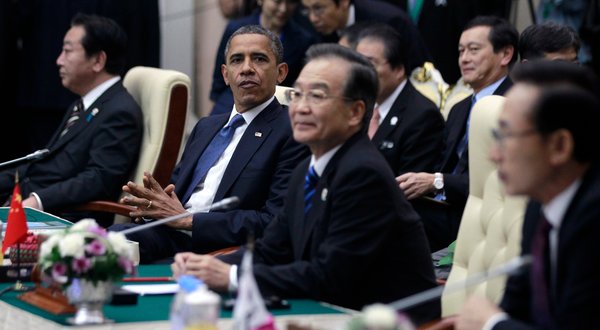Big surprise: Asia wants a regional trade bloc that includes China
 Friday, November 23, 2012 at 9:53AM
Friday, November 23, 2012 at 9:53AM 
The Obama Administration's big idea was a Trans Pacific Partnership that magically excluded China. It is the lynchpin, along with the "strategic pivot" of US military forces into East Asia, of his dreamt-of 21st century containment of China's rise.
The "pivot" idea is merely stupid, but the TPP was magnificently dumb.
We encouraged China's rise (after encouraging the tigers and before that South Korea and Japan) by playing regional military Leviathan and enabling their export driven growth by keeping our markets open. The implicit deal: take that trade surplus (now consolidated by assembler-of-last-resort China) and plow it back into US debt markets, keeping our dollar cheap and enabling more of the same (we import goods, we export security, everybody peacefully rises, and the world is a better place).
That transaction strategy, as I have called it, worked wonderfully for years and years. But it came to its logical endpoint in the crash of 2008. We simply can't sustain such a grand strategy any more and, frankly, we don't need to. Asia is risen, it remains peaceful, and its logical regional integration now proceeds.
Can we still play Leviathan in this process? At great cost, yes, but a Leviathan is not what is needed now. It is now longer a possible achievement, given China's rise, and attempting to maintain that status now only gets you unnecessary tensions and arms racing.
Instead, the economic integration needs to be matched by suitable regional security arrangements. Those arrangements tend to come via crises or hotspots like the South China Sea issue. You either fix them or they fix you.
The new grouping is seen as a rival to a trade initiative of the Obama administration, the 11-nation Trans-Pacific Partnership, which includes many of the same countries but excludes China.
The announcement came as China was facing pressure to back down from its hard-line stance in its disputes with four Southeast Asian countries over ownership of islands in the South China Sea.
What ASEAN's proposed Regional Comprehensive Economic Partnership says is that, no matter the lingering tension on the islets issue, Asia's economic and trade and investment integration will proceed. And no, it won't be held hostage to Obama's containment fantasies.
Some analysts in Asia describe the Obama administration’s trade initiative as one element in a policy to contain China, the world’s largest producer and exporter of manufactured goods.
“China’s exclusion is strange, given its huge economic presence in the Asia-Pacific” region, Amitendu Palit, a visiting senior research fellow at the Institute of South Asian Studies at the National University of Singapore, wrote in a recent edition of East Asia Forum. “This has given rise to views that the United States is driving the Trans-Pacific Partnership with the strategic objective of marginalizing China.”
There are plenty of Chinese behaviors that we need to work, but we're no longer in charge of how things unfold in Asia, and no amount of military hardware parked there is going to change that.
 Asian integration,
Asian integration,  China,
China,  US foreign policy | in
US foreign policy | in  Citation Post |
Citation Post |  Email Article |
Email Article |  Permalink |
Permalink |  Print Article
Print Article 









Reader Comments (6)
While the US was babysitting in Iraq and Afghanistan, China consolidated control over the South China Sea.
Congratulations to China. They should name an island in honor of George W. Bush.
The question is what would be the alternative for the USA? Mitt Romney proposed a "Reagan Economic Free Tradezone" for the Asia-Pacific. However he didn´t make clear what this means. Is this a revitalized APEC, an enlarged TransPacific Partnership Programme (TPP) or what else?
However, if the USA doesn´t revive its free trade policy in Asia, she will become isolated.
I think the logic is to provide an alternative trade block to protect Asian nations from Chinese pressure. As we know from the Philippines' recent experience with the Scarborough Shoal and the recent ASEAN meeting, China can be extremely bullying in its trade relations. Realistic or not, the point of such a trade block would be to shield Asian nations from Chinese pressure.
“This has given rise to views that the United States is driving the Trans-Pacific Partnership with the strategic objective of marginalizing China.”
That maybe the strategic objective, but the objective result could be that the Trans-Pacific Partnership will marginalize the USA in the Asia-Pacific.Without China, India, Japan and Southkorea this whole idea is doomed to fail.
Some years ago the German journalist Gabort Steingart proposed an "economic NATO"including the USA and Europe as an answer aganist the Asian/Chinese threat.This idea of a Transatlantic Freetrade Area (TAFTA) was also promoted by German Chancellor Merkel. But it seems that the free trade idea has no real supporters in the USA and Europe anymore--especially after the financial crisis in 2008 and now the Eurocrisis.While the West ,even between close allies like the USA and Europe is stagnating in the field of free trade, the Asians have taken over the locomotive for free trade in Asia and the world.
"Realistic or not, the point of such a trade block would be to shield Asian nations from Chinese pressure."
I think it´s unrelistic as long as Japan, Southkorea, India and most of the ASEAN are not participating.Till now TPP includes only small states like Brunei, Singapore and the biggest state is Australia.Not very much as a counterbalance and a "shield". And what happened to APEC? Seems that the USA don´t support its own project anymore.